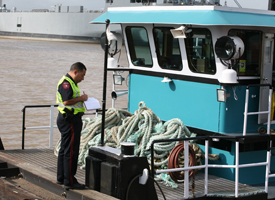Christopher Chung, associate professor in the Cullen College’s Department of Industrial Engineering, has received a grant to develop a system to identify marine vessels as they enter sensitive areas.
The system will be based on Radio Frequency Identification (RFID), a technology that allows for automatic communication between a small electronic tag and an RFID reader. RFID is commonly used in industrial applications. By placing a reader at a warehouse’s loading doors, for example, a company can automatically track tagged good as they come and go.
Chung’s idea, supported by a roughly $192,000 grant from the Department of Homeland Security, is to integrate RFID tags into marine vessel registration stickers. Authorities could then set up RFID readers around sensitive areas, such as ports, to identify ships that enter and exit. “If you have a vessel that comes into a port and it has no RFID signal, then you know there’s something unusual about it. If a vessel goes into a restricted area and it has no tag on it, you know there’s a potential situation,” Chung said.
The system, he added, could also be used to identify ships with unusual travel patterns. If a vessel repeatedly visits an area known for drug and/or human trafficking, authorities will know to pay closer attention to it.
Chung will use the grant funds to evaluate system components such as RFID tags and antenna readers. In particular, he will look for components that are best suited for the maritime environment, such as tags that have good signal strength and antenna readers that can be integrated into flotation devices in order to cover large areas. He will test the system in the jetties of Galveston Bay as well as in the Clear Lake area.
Chung is collaborating on this project with Lawrence Schulze, also with the Cullen College’s industrial engineering department.
